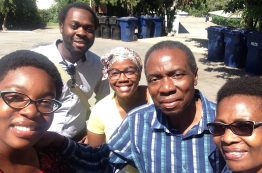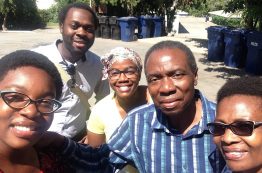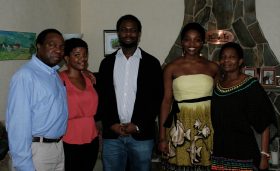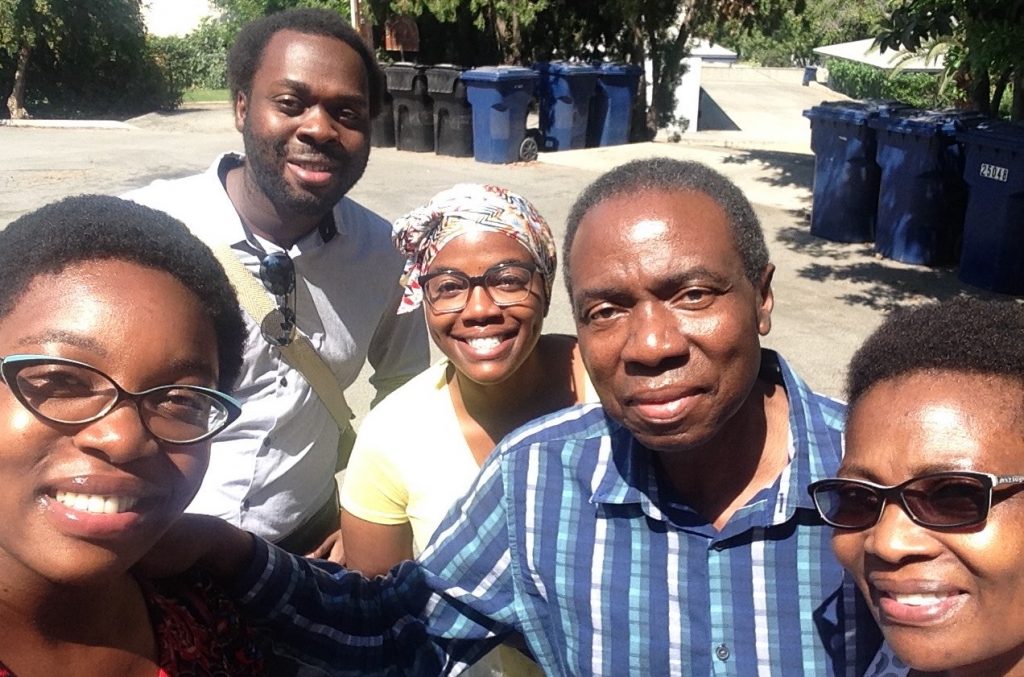
The author, far left, with members of her family, including her late father, Mathias, second from right. (Courtesy of Michelle Chikaonda)
I used to be the person who was late for everything.
Dinner reservations at 8 p.m.? I’d clatter sweatily into the restaurant at 8:20 p.m., muttering something about how slow the trolleys were tonight and how the city of Philadelphia needed to invest more in public transportation. Doctor’s appointment at 3:15 p.m.? I’d rush in at 3:25 p.m., figuring that the doctor’s office was always so behind on appointments anyway, and at least now less of my time would be wasted. I once missed a friend’s surprise engagement picnic because I showed up at 2 p.m. instead of the requested noon; I reasoned that I’d have shown up on time if he’d told me beforehand that he was planning on proposing to his girlfriend. And for my own parties, which I usually scheduled to begin at 7 p.m.? I would actually stipulate in the invitations that guests shouldn’t bother arriving until at least 8:30 p.m., unless they wanted to sit around awkwardly while I showered and got ready.
READ: Making My Dad A Searchable Term
Then my father died of colon cancer in October 2018. He and my mother had relocated from our home country of Malawi to Loma Linda, California, for treatment not available to him in Malawi, and he died in Loma Linda, almost two years after he was initially diagnosed. My father and I had always had the same approach to time — that if the thing that was supposed to happen ultimately did happen, then it really didn’t matter what time we first got there. Dad had such notorious problems with lateness, so much so that “Chikaonda Time” became a deeply entrenched running joke in our circle of family and friends. There were furious dashes to the airport and missed restaurant reservations. Somehow Dad even managed to be late to his own burial — the funeral home in California filed the wrong paperwork before his departure for Malawi, and so his casket was returned to Loma Linda from LAX the night of his scheduled departure. The funeral in Malawi had to be moved to the following week.
Dad had such notorious problems with lateness, so much so that “Chikaonda Time” became a deeply entrenched running joke in our circle of family and friends.
When I returned to Philadelphia in January 2019 — after the three months I’d been away in California and then Malawi during Dad’s final illness, passing and funeral — I made a full roster of meet-ups and appointments with the friends who had supported me in that time, whom I had missed terribly during the time that I was away. The very first time I showed up on time, to watch the Eagles play the Saints at a bar just off of Philadelphia’s South Street, the group of friends I was meeting with joked, “We feel ashamed — Michelle beat us here” But then it happened again a few weeks later, at a happy hour with friends from out of town, and then again a month after that, all with the same set of friends. “You’re three for three now,” one of them exclaimed.
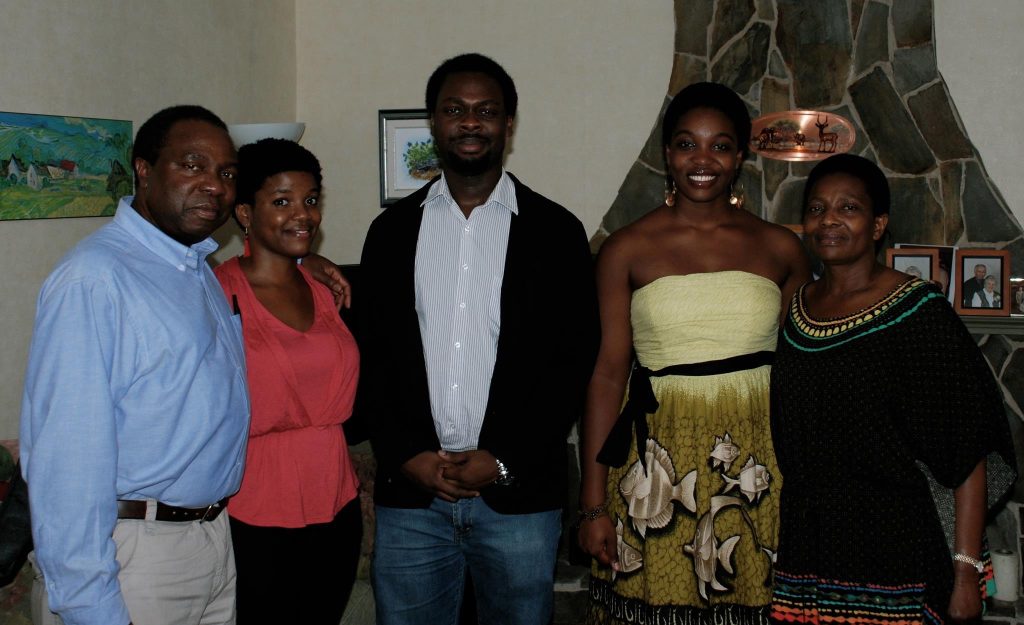
The author, second from right, with members of her family, including her late father, Mathias, at left. (Courtesy of Michelle Chikaonda)
It wasn’t just for these friends, either. I arrived in advance to office happy hours and scheduled overseas Skype calls alike. I found myself getting to the movies well before the lights were turned down, and getting to my airport gates over an hour in advance, rather than 30 minutes before when the plane was already boarding. And for my birthday picnic this past June I was the first one at the riverbank spot I’d told everyone to meet me at; accustomed to my old ways, the first guests didn’t arrive for another 45 minutes.
As it kept happening — as I kept showing up places on time or else by exactly the time I said I would be there — I realized that something else might be going on. My initial impression of it was that I just suddenly, inexplicably felt this need to respect the time of the folks around me, that it was rude and wrong to show up late even if I knew they were close enough friends to keep on forgiving me. My therapist suggested that in the wake of my grief I had suddenly become fanatical about controlling everything I possibly could, up to and including time itself, as a counterweight to the massive thing that had just happened that I’d had no control over at all.
But I came to the understanding that it wasn’t quite either of those things. It was the profound realization that nothing I was doing at any moment was so important that it justified disrespecting the next thing that I had deemed important enough to have said I would make time for it. I really did want to get there, to get each moment started and live it completely. I didn’t want to miss anything. And the feeling accompanying each meet-up, now that I was on time, was no longer shame, or the fear of time-related failure, or frustration and desperation — it was now eagerness, joy in seeing each friend, security in knowing I wouldn’t once again be the last passenger boarding a plane, or be staring blankly at a movie screen wondering what core plot detail I’d missed.
READ Dad’s Voice in the ‘Tower of Song’
When I was late, I missed things — a lot. On the benign end of this, what I missed was merely a few minutes of settling-in conversation, maybe the table’s server making their first pass for appetizer orders, the movie trailers for films I’d never watch anyway. But at the highest end of this, I’d missed really important moments, whole events even, because I got there late. And so did my father — he was constantly late for board meetings at which he was the Chair, and dinners for which he was the guest of honor; he regularly arrived with only an hour remaining at Parent Days at the boarding school my siblings and I attended, and with barely minutes to spare before our flights to our various colleges started boarding, after we’d decided to leave him behind at the house so we wouldn’t miss check-in. “The boss is never late — only delayed,” Dad used to mischievously declare, in order to shut down protests at another tardy arrival; yet, when he outright missed the wedding of a close friend’s son — whose bride had actually used our home for her ceremony preparations that morning — I wondered how much water that claim could really hold against a friend’s disappointment at his absence at something so important. I know that for me, “Chikaonda Time” had long stopped feeling so funny; and yet, up until early this year, I, too, seemed to have become content with playing out the joke.
I think it’s as elemental as not wanting to lose any more time than has already been lost.
A year into my newfound timeliness, I think it’s as elemental as not wanting to lose any more time than has already been lost. Perhaps because of how Dad died — he got far longer than his initial diagnosis predicted, but the time he had left was still too short to have any spare to throw away, especially with there gradually being fewer and fewer good moments between the pain, fatigue, and mental haze of Dad slowly slipping away from us. For the nearly two years of his course of treatment, it became really important to show up on time, and to be there for all the moments for which it was possible to be there. Missing flights was no longer a worthwhile risk; missing church with him and Mom because I’d gotten up too late didn’t seem so excusable. It’s not so much that, before his diagnosis, I didn’t understand that all of us would die one day; but that diagnosis put a finish line definitively in front of us, and, with that an end to any self-deceptions I might have harbored about being able to make for lost time one hypothetical day in the future.
These days, I don’t mind being one of the first people arriving at the places I’m supposed to be; I have, in fact, come to really like it. And after the life chaos of the two years for which Dad fought his disease and our family arranged our lives around that battleground, I find that I also like having none of those two years’ pressures on my free time anymore, as simultaneously painful as that absence of burden is. Knowing there is nowhere else I should be, no research I could be doing this very moment on the latest turn of the illness, no more reassuring calls to my mother and sister. “As guilty as I feel saying this,” I told my boss when I got back to the office last year, “I’m really looking forward to having my time back.” And though Dad is now my late father and can’t express an opinion on this anymore, I know he wouldn’t want me conducting my life as though I were late, too — a half-present shadow of myself living in my memory of a time when he was still here.
I enjoy the moments of peace that arriving early now gives me. Rather than feeling like a waste of time, I make sure to use that time to send a WhatsApp message to my cousins back home in Malawi or to read an article one of my writing friends sent me that morning, or simply sit in the glow of the setting sun on a sidewalk bench, watching young families push strollers and take their puppies on an evening walk, eavesdropping on college students rehashing last night’s drama with their friends. It allows me a fuller presence that I don’t think I had whenever I felt like I had to do immediate penance post-arrival for all the time I’d missed in my delays. What I love the most in that moment of early quietude, though, is the precise second that it ends because the people I love finally appear, and we hug, and we are thrilled to see each other for the fullness of the time that we’d planned. We are here, living every minute of this life, for I am, finally, on time.
Michelle Chikaonda has won the Archie D. and Bertha H. Walker Scholarship for writers of color from the Fine Arts Work Center in Provincetown and The Seventh Wave’s Rhinebeck Residency. She is a VONA fellow, a Tin House Summer Workshop alumna, and a Pushcart Prize nominee. Her work has been published in The Globe and Mail, Catapult, Hobart, and the Kalahari Review, among others. You can read more of her work at michellechikaonda.work.

